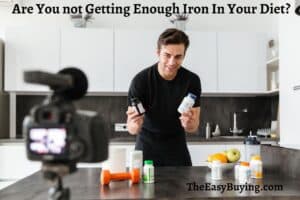Low testosterone levels are often associated with old age. As men get older, they tend to experience declines in their testosterone levels. However, there are many other causes of low testosterone levels such as smoking and excessive alcohol consumption. This is why it is important to know these signs and causes of low testosterone. You can take steps toward preventing them from occurring in the first place.
The human body is an intricate system of interlocking parts, each of which has a specific function. In order to keep the body functioning properly, it’s important that all its parts are doing their jobs. Many people are unaware of the signs and causes of low testosterone levels. It can have a serious impact on their lives and can be a cause of many problems if left untreated. It can affect your health in a negative way. Low testosterone levels can cause problems in many aspects of your life such as physical, mental, and sexual health.
Why is it important to maintain optimum Testosterone levels?
Testosterone is a hormone that is responsible for a number of physiological processes in the body, including sexual development, physical growth, and maintenance of muscle mass. In healthy individuals, testosterone levels generally peak around the age of 30 and then gradually decline over the course of the next decade or so. However, there are a number of factors that can affect testosterone levels, including age, illness, and lifestyle choices.
Maintaining optimal testosterone levels is therefore important for both men and women, and there are a number of ways to achieve this. Therefore, one should know the signs and causes of low testosterone. Some of the simplest ways to maintain optimal testosterone levels include: getting enough sleep, exercising regularly, eating a healthy diet, and avoiding excessive stress. However, these measures are not always possible or practical, so it is important to also consider lifestyle choices that can help to boost testosterone levels. For example, choosing to abstain from smoking, drinking alcohol, and using marijuana can all have beneficial effects on testosterone levels. Additionally, some supplements may also be useful in boosting testosterone levels, including testosterone boosters for men and testosterone boosters for women.
What are the Causes of Low Testosterone?
Low testosterone is a condition that affects men throughout their lives. It can be caused by a variety of factors, including genetics, age, lifestyle, and medical conditions.
There are some main causes of low testosterone:
1. Hypogonadism.
This is when the body has a low level of testosterone. There are many different types of hypogonadism, but the most common is idiopathic hypogonadism, which is caused by an unknown cause. This type can be caused by pituitary gland dysfunction, which is when the body doesn’t produce enough luteinizing hormone (LH) or follicle-stimulating hormone (FSH). LH and FSH are hormones that stimulate testosterone production.
2. Hormonal imbalances.
Testosterone is a hormone that is produced by the testes and ovaries in both men and women. It is responsible for the development of male sex characteristics and helps regulate the function of several other hormones in the body, such as estrogen and progesterone. Testosterone levels tend to decrease with age, which can lead to a number of health issues, including erectile dysfunction.
3. Erectile dysfunction.
Erectile dysfunction is a common side effect of low testosterone, and it can be caused by several factors.
Low testosterone can cause erectile dysfunction because it interferes with blood flow to the penis. It also causes increased levels of SHBG (sex hormone-binding globulin), which binds to testosterone and makes it less effective at increasing libido and sexual function.
Other causes of erectile dysfunction include obesity and diabetes, which are common in men who have low testosterone levels. Both obesity and diabetes can cause impaired blood flow to the penis, which leads to erectile dysfunction.
4. Insufficient exercise.
Insufficient exercise is one of the most common causes of low testosterone. If you’re not working out enough, your body isn’t going to produce enough testosterone to keep you healthy. You should be exercising for at least 30 minutes a day for five days a week, and ideally more than that.
5. Deficiency in zinc.
A deficiency in zinc is a common cause of low testosterone. Zinc is essential for the normal production of testosterone, and deficiency of this mineral can cause low levels of this hormone.
Zinc deficiency is especially common in people who have chronic diarrhea or malabsorption syndrome. In addition, people who eat a lot of red meat and avoid dairy products may experience a deficiency in zinc because they are not getting enough calcium to absorb the zinc that they need.
What are the Common Signs of Low Testosterone?
There are a few key signs that may indicate you have low testosterone. If you are experiencing any of these symptoms, it is important to get checked out by your doctor.
1. Difficulty gaining or maintaining weight.
Weight gain is a common side effect of low testosterone. This happens because testosterone helps regulate the production of sex hormones. Which helps to control how much fat is stored in our bodies. If your body does not produce enough testosterone, you may experience weight loss, muscle loss, and a lack of bone density.
2. Muscle loss or a decrease in strength.
If you’re noticing a loss of muscle mass or a decrease in strength, it could be due to low levels of testosterone.
Testosterone is the hormone responsible for muscle mass and strength. The more testosterone you have, the stronger and more muscular you’ll be.
If you notice that you’re losing muscle mass and strength, it could simply be that your body has become accustomed to your current level of activity, but if you’re experiencing an ongoing loss of muscle mass or strength after several weeks, then it’s worth getting checked out by a doctor.
3. Low sex drive.
A drop in testosterone can directly affect your sex drive. As your level of testosterone decreases, you may find that you have less desire for sex and are less interested in intimacy. This can be incredibly frustrating for both partners, especially if the person with low testosterone doesn’t know why they’re feeling this way.
4. Reduced energy.
Low testosterone can cause you to feel tired and unmotivated, so it’s important to pay attention to the way your body is feeling. You may want to add more exercise into your routine, or even take a nap if you’re feeling especially exhausted.
5. Depression
When your body doesn’t have enough testosterone, it can lead to depression, low energy levels, and loss of interest in sex. Depression is one of the most common symptoms of low testosterone. When your body doesn’t have enough testosterone, it can lead to depression, low energy levels, and loss of interest in sex.
Conclusion
Testosterone is one of the most important hormones in our body. It regulates many aspects of our health and well-being, including muscle mass and strength, fat distribution, bone density, moods, sexual function, and more. The good news is that Testosterone levels can improve with lifestyle changes such as diet and exercise so you don’t have to live with low Testosterone forever! I hope this article provided you with enough information about the Signs And Causes Of Low Testosterone.
FAQs
Can you live with low testosterone?
Yes, it is possible to live with low testosterone levels. However, it’s important to remember that you don’t have to live with low Testosterone because there are ways to increase your Testosterone naturally.
How can you increase your testosterone level?
There are many ways to naturally increase your Testosterone levels. These include diet and exercise, stress management, and other lifestyle changes.
How do you increase your testosterone levels naturally?
There are many ways to naturally increase your Testosterone levels. These include diet and exercise, stress management, and other lifestyle changes.
Can you increase your testosterone levels with supplements?
Yes, there are a few supplements that can help you naturally increase your Testosterone levels. These include ZMA, Vitamin D, and Magnesium.











